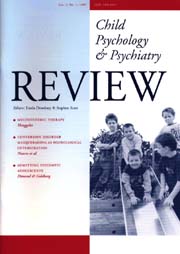Article contents
The Role of Play in the Life of the Child
Published online by Cambridge University Press: 01 September 1998
Abstract
Pellegrini and Smith (1998) have provided a challenging review of the forms and possible functions of play during childhood, and Blatchford's (1998) paper on children's play reports a programme of research about the nature of play at school breaktimes that seems to be the sort of research that Pellegrini and Smith recommend in their conclusion, calling for more descriptive studies of children's play. When considering the nature and possible functioning of play during childhood Pellegrini and Smith explore general definitional issues. They suggest that play theorists such as Piaget and Vygotsky considered that play was the way that children learnt skills necessary for successful functioning in adulthood. Perhaps this is a simple way to express, for example, Vygotsky's (1978) descriptions of play in ‘The Role of Play in Development’ in Mind in society. Vygotsky states that in play a child creates an imaginary situation; that play is the place where a child spontaneously makes use of his ability to separate meaning from an object without knowing he is doing it. The creation of an imaginary situation is the first manifestation of the child's emancipation from situational constraints and the primary paradox of play is that the child operates with an alienated meaning in a real situation. Vygotsky may be describing an important skill for successful functioning in adulthood, but it is also an important function in childhood.
- Type
- Forum on Play
- Information
- Copyright
- © 1998 Association for Child Psychology and Psychiatry
- 1
- Cited by


